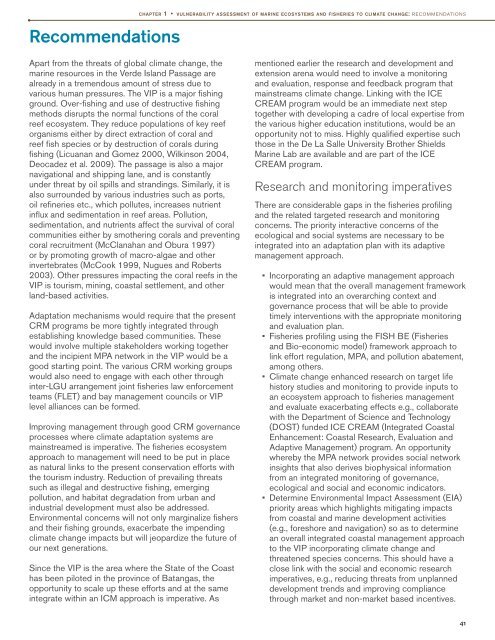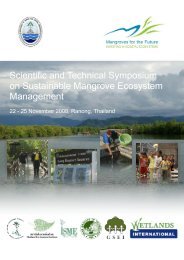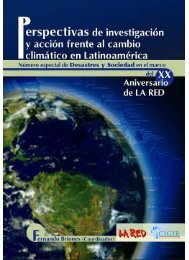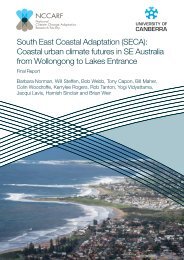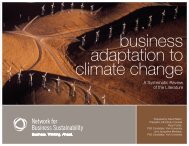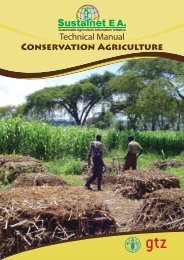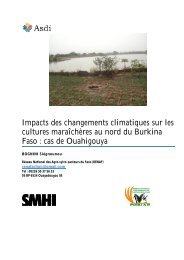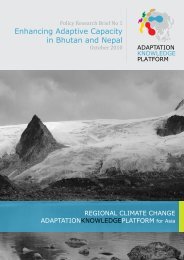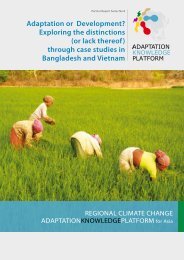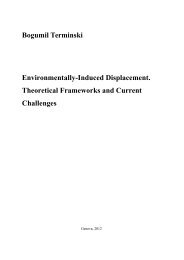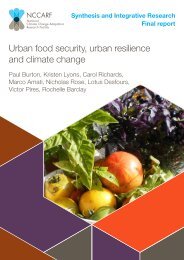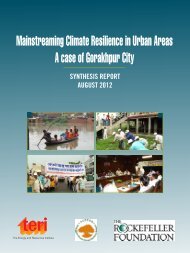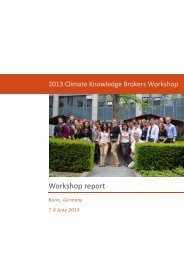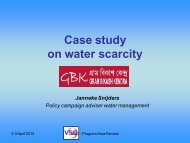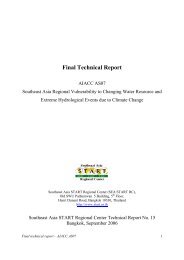of the Verde Island Passage, Philippines - weADAPT
of the Verde Island Passage, Philippines - weADAPT
of the Verde Island Passage, Philippines - weADAPT
You also want an ePaper? Increase the reach of your titles
YUMPU automatically turns print PDFs into web optimized ePapers that Google loves.
Recommendations<br />
chapter 1 • vulnerability assessment <strong>of</strong> marine ecosystems and fisheries to climate change: recommendations<br />
Apart from <strong>the</strong> threats <strong>of</strong> global climate change, <strong>the</strong><br />
marine resources in <strong>the</strong> <strong>Verde</strong> <strong>Island</strong> <strong>Passage</strong> are<br />
already in a tremendous amount <strong>of</strong> stress due to<br />
various human pressures. The VIP is a major fishing<br />
ground. Over-fishing and use <strong>of</strong> destructive fishing<br />
methods disrupts <strong>the</strong> normal functions <strong>of</strong> <strong>the</strong> coral<br />
reef ecosystem. They reduce populations <strong>of</strong> key reef<br />
organisms ei<strong>the</strong>r by direct extraction <strong>of</strong> coral and<br />
reef fish species or by destruction <strong>of</strong> corals during<br />
fishing (Licuanan and Gomez 2000, Wilkinson 2004,<br />
Deocadez et al. 2009). The passage is also a major<br />
navigational and shipping lane, and is constantly<br />
under threat by oil spills and strandings. Similarly, it is<br />
also surrounded by various industries such as ports,<br />
oil refineries etc., which pollutes, increases nutrient<br />
influx and sedimentation in reef areas. Pollution,<br />
sedimentation, and nutrients affect <strong>the</strong> survival <strong>of</strong> coral<br />
communities ei<strong>the</strong>r by smo<strong>the</strong>ring corals and preventing<br />
coral recruitment (McClanahan and Obura 1997)<br />
or by promoting growth <strong>of</strong> macro-algae and o<strong>the</strong>r<br />
invertebrates (McCook 1999, Nugues and Roberts<br />
2003). O<strong>the</strong>r pressures impacting <strong>the</strong> coral reefs in <strong>the</strong><br />
VIP is tourism, mining, coastal settlement, and o<strong>the</strong>r<br />
land-based activities.<br />
Adaptation mechanisms would require that <strong>the</strong> present<br />
CRM programs be more tightly integrated through<br />
establishing knowledge based communities. These<br />
would involve multiple stakeholders working toge<strong>the</strong>r<br />
and <strong>the</strong> incipient MPA network in <strong>the</strong> VIP would be a<br />
good starting point. The various CRM working groups<br />
would also need to engage with each o<strong>the</strong>r through<br />
inter-LGU arrangement joint fisheries law enforcement<br />
teams (FLET) and bay management councils or VIP<br />
level alliances can be formed.<br />
Improving management through good CRM governance<br />
processes where climate adaptation systems are<br />
mainstreamed is imperative. The fisheries ecosystem<br />
approach to management will need to be put in place<br />
as natural links to <strong>the</strong> present conservation efforts with<br />
<strong>the</strong> tourism industry. Reduction <strong>of</strong> prevailing threats<br />
such as illegal and destructive fishing, emerging<br />
pollution, and habitat degradation from urban and<br />
industrial development must also be addressed.<br />
Environmental concerns will not only marginalize fishers<br />
and <strong>the</strong>ir fishing grounds, exacerbate <strong>the</strong> impending<br />
climate change impacts but will jeopardize <strong>the</strong> future <strong>of</strong><br />
our next generations.<br />
Since <strong>the</strong> VIP is <strong>the</strong> area where <strong>the</strong> State <strong>of</strong> <strong>the</strong> Coast<br />
has been piloted in <strong>the</strong> province <strong>of</strong> Batangas, <strong>the</strong><br />
opportunity to scale up <strong>the</strong>se efforts and at <strong>the</strong> same<br />
integrate within an ICM approach is imperative. As<br />
mentioned earlier <strong>the</strong> research and development and<br />
extension arena would need to involve a monitoring<br />
and evaluation, response and feedback program that<br />
mainstreams climate change. Linking with <strong>the</strong> ICE<br />
CREAM program would be an immediate next step<br />
toge<strong>the</strong>r with developing a cadre <strong>of</strong> local expertise from<br />
<strong>the</strong> various higher education institutions, would be an<br />
opportunity not to miss. Highly qualified expertise such<br />
those in <strong>the</strong> De La Salle University Bro<strong>the</strong>r Shields<br />
Marine Lab are available and are part <strong>of</strong> <strong>the</strong> ICE<br />
CREAM program.<br />
Research and monitoring imperatives<br />
There are considerable gaps in <strong>the</strong> fisheries pr<strong>of</strong>iling<br />
and <strong>the</strong> related targeted research and monitoring<br />
concerns. The priority interactive concerns <strong>of</strong> <strong>the</strong><br />
ecological and social systems are necessary to be<br />
integrated into an adaptation plan with its adaptive<br />
management approach.<br />
• Incorporating an adaptive management approach<br />
would mean that <strong>the</strong> overall management framework<br />
is integrated into an overarching context and<br />
governance process that will be able to provide<br />
timely interventions with <strong>the</strong> appropriate monitoring<br />
and evaluation plan.<br />
• Fisheries pr<strong>of</strong>iling using <strong>the</strong> FISH BE (Fisheries<br />
and Bio-economic model) framework approach to<br />
link effort regulation, MPA, and pollution abatement,<br />
among o<strong>the</strong>rs.<br />
• Climate change enhanced research on target life<br />
history studies and monitoring to provide inputs to<br />
an ecosystem approach to fisheries management<br />
and evaluate exacerbating effects e.g., collaborate<br />
with <strong>the</strong> Department <strong>of</strong> Science and Technology<br />
(DOST) funded ICE CREAM (Integrated Coastal<br />
Enhancement: Coastal Research, Evaluation and<br />
Adaptive Management) program. An opportunity<br />
whereby <strong>the</strong> MPA network provides social network<br />
insights that also derives biophysical information<br />
from an integrated monitoring <strong>of</strong> governance,<br />
ecological and social and economic indicators.<br />
• Determine Environmental Impact Assessment (EIA)<br />
priority areas which highlights mitigating impacts<br />
from coastal and marine development activities<br />
(e.g., foreshore and navigation) so as to determine<br />
an overall integrated coastal management approach<br />
to <strong>the</strong> VIP incorporating climate change and<br />
threatened species concerns. This should have a<br />
close link with <strong>the</strong> social and economic research<br />
imperatives, e.g., reducing threats from unplanned<br />
development trends and improving compliance<br />
through market and non-market based incentives.<br />
41


